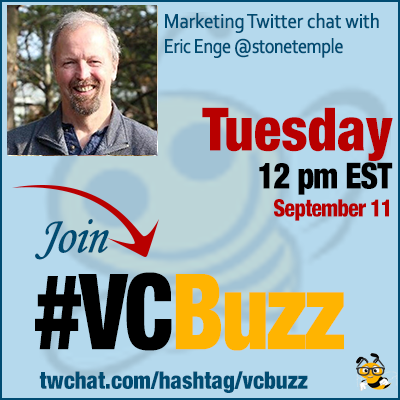 There has been a lot of talk lately around relevancy: Some of the spring Google core algorithm updates are said to have had something to do with Google focusing on relevancy more.
There has been a lot of talk lately around relevancy: Some of the spring Google core algorithm updates are said to have had something to do with Google focusing on relevancy more.
But what is relevancy and how to analyze it? Let’s discuss!
***Add #VCBuzz chats to your calendar here.
***Please sign in here to follow the chat -> twchat.com/hashtag/vcbuzz
About Eric Enge @stonetemple
Eric Enge is the CEO of Stone Temple Consulting, an SEO consultancy outside of Boston. Eric has years of digital marketing experience and he is undoubtedly one of the most trusted experts in the industry.
Eric also writes for The Digital Marketing Excellence blog. Eric is a speaker and keynote speaker at multiple digital marketing conferences.
Questions we discussed
Q1 How did you become a digital marketer? Please share your career story!
It was an accident. I was working as a biz dev consultant. Then a friend asked me to help him with his company selling DVDs online.
Then I figured out that he didn’t need biz dev, and I said to him, maybe we should try to get some traffic from search! Like a good CEO, he said, Eric, your idea, you go do it.
A year later, we were doing $3M per year in sales from SEO, and I said, maybe I should do this for a living! It was off to the races from there.
It’s been a wild ride ever since then. Ultimately, sold Stone Temple to Perficient (NASDAQ:PRFT) a marge larger consulting firm. That happened on July 16 of this year!
When I was starting in the industry, @stonetemple was THE guru! Still kind of shy even talking to him at events 😊 #vcbuzz
— Ann Smarty (@seosmarty) September 11, 2018
@seosmarty You're too kind! Happy to chat with at any time. You've done some great stuff over the years too. #vcbuzz
— Eric Enge (@stonetemple) September 11, 2018
@stonetemple awesome story #vcbuzz I'm still in the struggle to startup.
— Oh! Natural Aromatherapy – Pam Gomez (@OhNaturalAroma) September 11, 2018
@OhNaturalAroma Hope it goes well for you! It takes time. Success is rarely built quickly #vcbuzz
— Eric Enge (@stonetemple) September 11, 2018
Q2 What is keyword relevancy and why does it matter?
Great question. KW relevancy is at the core of SEO. Put simply, if the content is not relevant, it can’t rank. Obvious example: A page about tupperware can’t rank for “used cars”. It doesn’t make sense.
But, it’s not that simple. Think of relevancy as a sliding scale. You can be highly relevant, pretty relevants, somewhat relevant, etc.
For sake of discussion, imagine that relevance is scored from 0 to 1. Let’s say your page has a relevance score of .96, that’s pretty high, right? But what if your competition has a score of 0.99. They’re a lot more relevant.
A2: Keyword relevance is having content that relates to our business. In other words, it's reflecting what you do. #VCBuzz
— Narmadhaa (N) (@s_narmadhaa) September 11, 2018
So now, how do you maximize your relevance? That’s a great question! The key is understanding what the main user intent is to the key phrase you want to rank for. Let’s look at an example, going back to the phrase “used cars”.
Obviously, your page should talk about used cars. But, what are the user related needs when they search on something like that? What about your page is highly relevant to them? Obviously, they might want to see some info on used cars they can buy.
But what else might they want? Some ideas: (1) A way to compare user cars for sale so they can make the best choice; (2) A way to filter available cars by make model year; (3) More filters: body type, color, mileage, price; (4) the maintenance history of the car; (5) information on the typical lifecycle for this make model year (how long it will last); the list goes on. So how can you make your content satisfy the largest possible % of users who come to your page?
I agree with Eric @stonetemple that you MUST know how your potential buyers search. They don't know all the industry jargon and terminology insiders use. You need BUYERS to find you – not just other experts. #vcbuzz
— Gail Gardner (@GrowMap) September 11, 2018
That’s the question you need to ask, and need to answer, to maximize the relevance of your page! And, at the core of all that, is the right KW research.
In other words, pages and relevant keywords build on one another. It's like a giant chain, wouldn't you say? #VCBuzz – A2
— Narmadhaa (N) (@s_narmadhaa) September 11, 2018
And that's how we build internal (and even external) links. #VCBuzz
— Narmadhaa (N) (@s_narmadhaa) September 11, 2018
Q3 What are factors Google may use to determine if a site is reasonably relevant for the keywords it targets?
Now for the tough question! So obviously, we don’t have the exact map of Google’s algos. But, we know some things they can do. First, they can perform a semantic analysis of your page, and see what content is on it.
The semantic analysis is important. They can also compare your content with other content that they rank highly for the query. They can use this so see if you’re covering the right topics.
They can also look at search query histories. If a user types in “used cars” and doesn’t like the results they get, what is the next query they try? That’s a clue to Google about what the user wanted to find in response to the first query.
A3: Meta tags are always key. We should have titles and descriptions that say what the page is about. And the content of the page itself should be coherent and involve the keywords, without being stuffed nonsensically. #VCBuzz
— Narmadhaa (N) (@s_narmadhaa) September 11, 2018
@s_narmadhaa yes, all of this factors into the basics of the semantic analysis of the content. #vcbuzz
— Eric Enge (@stonetemple) September 11, 2018
Absolutely. Can’t tell you how many times I work on a client’s website and see all of this is missing or using words that aren’t helpful #VCbuzz
— Meryl K. Evans (@merylkevans) September 11, 2018
They can also measure user engagement, and exactly how they do that is not 100% clear. I don’t think it’s as simple as bounce rate, for example. But, they surely do measure engagement. Do users like what they see when they get to your site/page?
And, frankly, links and mentions can be part of the picture too. Do highly relevant sites tend to refer to your site when discussing your topic area? It’s all part of the broader relevance picture.
Google has also crawled forms and taken conversion into account as validation of relevant content in their secret algorithm.#SEO #VCBuzz @seosmarty
— Rebecca Murtagh 💡 (@VirtualMarketer) September 11, 2018
@VirtualMarketer yes, the dialog about you on the web matters a great deal. Does the world at large see you as relevant? If not, then highly relevant content may not be enough.#vcbuzz
— Eric Enge (@stonetemple) September 11, 2018
Q4 What to do if you find that a page is not relevant for the keywords it targets?
There can be many reasons for a relevance failure. The first is that your page is thin on content, or doesn’t do the right things with titles, headings, and main content. Google is still reliant on text to help determine relevance.
That’s where I’d start. Do the hard work of figuring out what content gaps you may have. See what the pages that are ranking high in the search results for the target query have in their content that you don’t.
Make sure your content is on point. The next thing to look at is how the rest of your site supports the target them of the keyword. Is your site all about the same topic area (is it focused) or is the content basically a one off page? Tough to win with those.
So maybe you need many pages of supporting content for Google to consider you relevant to a given topic.
+ then do a better job than those RT @stonetemple: A4: Do the hard work of figuring out what content gaps you may have. See what the pages that are ranking high in the search results for the target query have in their content that you don't. #vcbuzz
— Ann Smarty (@seosmarty) September 11, 2018
@seosmarty bingo! #vcbuzz
— Eric Enge (@stonetemple) September 11, 2018
As @seosmarty suggests, don’t simply make your content as good as the competition. Kick their butts to the curb and create something that’s much better.
Keep going back to the full experience for the user with your page and site, and create something amazing. The bad news: this is hard! The good news: once you’ve built it, you now have it, and for your competition – it’s still hard!
A4: I'd find out if the content on the page is relevant for another keyword the business targets. If so, optimise the page for that word instead. Otherwise, rethink the content and the strategy. #VCBuzz
— Narmadhaa (N) (@s_narmadhaa) September 11, 2018
Just think of the hard work of making great content and an exceptional user experience as a continual journey. It doesn’t have an end. It’s a mission. That’s the key to success with Google these days.
Copying the competition is always a bad idea. What works for them may not work for us—it all depends on our strategies and budget. #VCBuzz
— Narmadhaa (N) (@s_narmadhaa) September 11, 2018
@s_narmadhaa Great point. To many people copy their competitors, and find that it doesn't work for them at all. #vcbuzz
— Eric Enge (@stonetemple) September 11, 2018
Q5 What are your favorite keyword research tools?
There are so many! I use a wide variety of tools: Searchmetrics, SEMRush, Brightedge, Keyword Planner, and Answer the Public to name a few.
Answer the Public is particularly cool if you want to find the related questions people ask around your target topic area.
Also @Ahrefs, @Serpstat, @Spyfu! RT @stonetemple: A5: there are so many! I use a wide variety of tools: Searchmetrics, SEMRush, Brightedge, Keyword Planner, and Answer the Public #vcbuzz
— Ann Smarty (@seosmarty) September 11, 2018
Also great tools!
You can also do keyword research by speaking with prospects and clients. What language do they use? What are their biggest questions? TONS of great data there.
A5 for content research: @Buzzsumo Questions, @Serpstat Questions, @Ahrefs Content Explorer, @SEMrush topic research => All GREAT innovative features! #vcbuzz
— Ann Smarty (@seosmarty) September 11, 2018
A5: I've used many of the tools @seosmarty and @stonetemple mention. No faves. Depends on the project. Had a tricky situation where client wanted to rank for words prospects wouldn't use. Just add them as best as you can but include keywords prospects will use #vcbuzz
— Meryl Evans, CPACC (@merylkevans) September 11, 2018
Our previous SEO chats:
- Essential Steps of an SEO Audit with @MattLacuesta #VCBuzz
- How to Combine SEO and Social Media w/ Anita Cohen @anitasearchguru #VCBuzz
- SEO Coaching and Findability Principles with Heather Lutze @HeatherLutze
- Domains and SEO: Myths and Tips with Bill Hartzer @bhartzer
- Marketing Twitter Chat with International SEO Consultant Aleyda Solis @aleyda




Leave a Reply